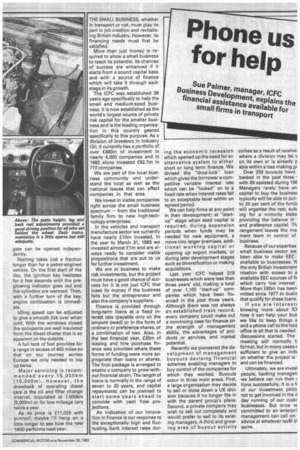Phone us for help
Page 43

If you've noticed an error in this article please click here to report it so we can fix it.
Sue Palmer, manager, ICFC Business Development, explains the financial assistance available for small firms in transport
THE SMALL BUSINESS, whether in transport or not, must play its part in job creation and revitalising British industry. However, its financing needs must first be satisfied.
More than just money is required to allow a small business to reach its potential. Its chances of success are enhanced if it starts from a sound capital base and with a source of finance which will take it through each stage in its growth.
The ICFC was established 38 years ago specifically to help the small and medium-sized business. It is now established as the world's largest source of private risk capital for the smaller business and is the leading organisation in this country geared specifically to this purpose. As a division of Investors in Industry (3i), it currently has a portfolio of over £480m of investment in nearly 4,000 companies and in 1982 alone invested £92.7m in 772 companies.
We are part of the local business community and understand the local as well as the national issues that can affect companies in that area.
We invest in viable companies right across the small business spectrum — from the traditional family firm to new high-technology enterprises.
In the vehicles and transport manufacture sector we currently have nearly E10m invested. In the year to March 31, 1983 we invested almost Elm and are always ready to consider viable propositions that are put to us for further investment.
We are in business to make risk investments, but the project must have a good chance of success for it is not just ICFC that loses its money if the business fails but the entrepreneur and also the company's suppliers.
Finance is provided thrciugh long-term loans at a fixed interest rate (payable only on the amount owed) or in the form of ordinary or preference shares, or a combination of two. Also, in the last financial year, £20m of leasing and hire purchase finance was provided where these forms of funding were more appropriate than loans or shares. The final package is arranged to enable a company to grow without financial strain. The length of loans is normally in the range of seven to 20 years, and capital repayments can be planned to start some years ahead to coincide with cash flow projections.
An indication of our innovation in finance is our response to the exceptionally high and fluctuating bank interest rates dur ing the economic recession which opened up the need for an alternative system to either short or long term finance. We divised the "drop-lock" loan which gives the borrower a competitive variable interest rate which can be "locked" on to a fixed rate when interest rates fall to an acceptable level within an agreed period.
We can help firms at any point in their development: at "startup" stage when seed capital is required, during expansion periods when funds may be needed for new equipment, a move into larger premises, additional working capital or opening up export markets, or during later development stages such as diversification or making acquisitions.
Last year ICFC helped 319 businesses which were less than three years' old, making a total of over 1,100 "start-up" companies which have been financed in the past three years. Although there was not always an established track record, every company could make out a convincing case for finance on the strength of management ability, the advantages of pro.ducts or services, and market potential.
Recently we pioneered the development of management buyouts devising financial schemes enabling managers to buy control of the companies for which they worked. Buyouts occur in three main areas. First, a large organisation may decide to sell or close down a UK division because it no longer fits in with the parent group's plans. Second, a private company may wish to sell out completely and would prefer to sell to its existing managers. A third and growing area of buyout activity comes as a result of receive' where a division may be v on its own or is already p able within a loss making gr
Over 250 buyouts have backed in the past three with 89 assisted during 19E Managers rarely have en capital to buy the busines. typically will be able to put to 20 per cent of the funth will organise the rest, sub: ing for a minority stake providing the balance in and preference capital. Th rangement leaves the mai ment team in controi of business.
Because of our expertise small business sector we been able to make EEC available to businesses. ■11( the only British investment nisation with access to a available EEC sources of fii which carry low interest More than £60m has been milted since 1977 to busin that qualify for these loans.
If you are interest( knowing more about ICf how it can help your bus we like to keep things s and a phone call to the loca office is all that is needed discussions started. The meeting will normally b formal, but in many cases c sufficient to give an indi( on whether the project is and can be financed.
Ultimately, we are inves1 people, backing manager: we believe can run their tions successfully. It is a fi of our investment philo not to get involved in the d day running of our custc businesses. But once w committed to an enterpri management can call on advice at whatever levbi tF quire.




























































































